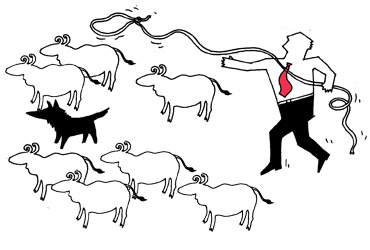
Charanpreet Singh, Associate Dean, Praxis Business School, Kolkata lists the 15 common blunders most people make at an MBA Group Discussion and tells you how to deal with them.
You are done with the Common Admission Test (CAT) and are probably lining up yourself for some of the other admission tests.
This is a good time to brush up your skills for the last mile of selection -- group discussion and interview (GD-PI).
Interestingly, there are lot of speculations and confusions among aspirants regarding GD-PI.
Having been a part of selection panels representing both the corporate and institutional recruiters for several years, I have witnessed, moderated and assessed performance in innumerable GD-PIs. It is fascinating to see students trying really hard, but ending up doing things that they should rather avoid.
Here is a list of things candidates need to stay clear off if they wish to make the right impression on the interview panel. Avoiding the don'ts will help recognise the real differentiators, and the direct preparation towards improving ability to score higher on them.
Let's begin with GD. A group of students is assigned a topic for discussion for 15 to 20 minutes. The panel is looking for an effective combination of knowledge and skills in the candidates. Some serious 'don'ts':
The author is an alumnus of IIT Kanpur and University of Iowa; he was earlier Country Manager, Marketing at Hewlett Packard.
Illustration: Uttam Ghosh

Being punctual shows you value time and respect the institute's time as well.
Arriving early gives you a chance to familiarise yourself with the environment, meet your 'competitors' and become a little easy about the whole thing.
Less stress equals better performance.
Illustration: Dominic Xavier

Often moderators ask the participants to introduce themselves.
It sounds simple, so candidates don't give this part much thought.
Consequently, we see poorly-structured, fumbling introductions, making a negative impression on the panel and participants.
Illustration: Dominic Xavier

If you do not know much about or do not understand the topic, the worst thing you can do is ask the moderator.
It shows you in poor light, either in terms of knowledge or analytical ability, or both.
You need to keep quiet and listen to your peers; as the discussion unfolds, you will know what to say.
Illustration: Dominic Xavier

Starting the discussion does not by itself necessarily give you extra points; it does, however, give you some visibility.
So, if you do manage to start, make sure you make a positive impact.
It's better not to start the discussion than to make an average or poor start.
Illustration: Dominic Xavier

Majority of candidates start the discussion by voicing their own opinion -- that's typically the debate situation.
In GDs, moderators look for candidates who can create a framework for discussion or help widen its scope by guiding the group to explore its different aspects.
If all you have to say is whether you agree with the topic or not, and that too before you get a chance to discuss it with the group, you have made a poor start.
Illustration: Uttam Ghosh

Many candidates believe that the corporate world is seeking aggressive managers.
The industry, on the contrary, is looking for managers who can work in and with teams and who are assertive without being aggressive.
To be aggressive is to impinge on others' space and time and that's not how a professional is expected to conduct him/her self.
So, don't come across as a smoke-spouting matad#8744 you need to come across as an effective team-player who works with the group, accommodates diverse viewpoints and asserts him/ her-self without aggression.
Illustration: Dominic Xavier

Leadership cannot be demanded, it is bestowed by the group and you have to earn it on the basis of the quality of your performance.
Candidates often try very hard to assume a leadership position in the group -- obviously in the belief that the moderator is assessing them on leadership potential.
The effort shows -- and, almost always, with disastrous results. If you add value to the discussion by demonstrating knowledge and analytical ability and conduct yourself with dignity, you may emerge as a leader.
Illustration: Dominic Xavier

You are an equal among other equals in the group -- thus no divine power has given you the right to decide how others in the group should conduct themselves.
This is usually misconstrued as team skills by the participants but is actually unnecessary policing.
There is no one more irritating for the moderator than a member making inane statements like 'we must allow everyone to speak' and 'we are digressing from the subject.'
You are assessed on your ability to make compelling points on the subject assigned -- just do a good job of that and the assessment will take care of itself.
Illustration: Dominic Xavier

Most people love to hear themselves speak.
Most also believe that they have the most earth-shattering perspectives to share and that everyone else should just shut up and listen to them.
Armed with these beliefs, some candidates talk themselves to the proverbial death in GDs.
People who insist on talking a lot end up talking nonsense and repeating themselves ad-nauseum. These students are prime candidates for rejection -- no B-school wants to fill up its campus with people who don't let others talk.
Illustration: Dominic Xavier

I have mentioned that a wannabe moderator is the most irritating species in a GD.
A very close second is the self-appointed judge, who spends his/ her time in the GD making incisive statements like 'you made a good point,' 'he did not make sense to me,' 'I agree with her', etc.
Good to know who all are blessed with your approval, but what about making a contribution to the discussion with some valid, well-thought-out points?
Illustration: Dominic Xavier

The hallmark of good communication is effective listening.
Assessors actively seek superior listening skills in candidates.
Your body language and the content of your speech have to, therefore, demonstrate attentive listening.
Listening would automatically improve the quality of your content, and moderators are acutely aware of this.
Interrupting others, trying to dominate the discussion, ignoring group dynamics are all examples of poor listening skills.
Illustration: Dominic Xavier

A subject is bound to evoke diverse responses from the group members, in fact it is this diversity that makes for a rich discussion.
I have seen candidates shut out other points of view, ridicule the comments or ideas of others and expend their energies in trying to prove others wrong.
That is exactly what you should not do -- you need to learn to accept others' opinions and carry them in the group while putting your own perspective forward in a pleasant yet assertive manner.
It's about different ways of looking at things, not about right and wrong. Also, you need to be sensitive enough not to make comments that are likely to hurt the sentiments of any section or group of people.
Illustration: Dominic Xavier

This is related to the earlier point.
Managers need to be open minded about issues and have the capability of managing conflicting opinions.
If you come across as a person with strong, extreme, non-negotiable views, you would be doing yourself disfavour in the selection process.
The assumption would be that you are either unaware of the complexities of the issue or too closed minded to accommodate positions different from your own.
This becomes even more obvious in sensitive issues like reservation, terrorism, etc.
Illustration: Uttam Ghosh

A group discussion needs to involve the entire group, but students often indulge in parallel conversations with other members.
This is more evident when two members get caught up in trying to 'win' an argument.
Neither is likely to relent -- so you end up not winning the argument and losing the opportunity to get selected.
Avoid getting into long arguments – agree to disagree and move the discussion forward.
Illustration: Uttam Ghosh

You get credit for making new, valid points -- not for repeating or rephrasing points already made earlier in the discussion.
If you have nothing new to say, keep mum and think -- analyse the knowledge you have and try to apply it to the given situation.
Bring a new perspective or build and develop on points made by others.
Illustration: Uttam Ghosh